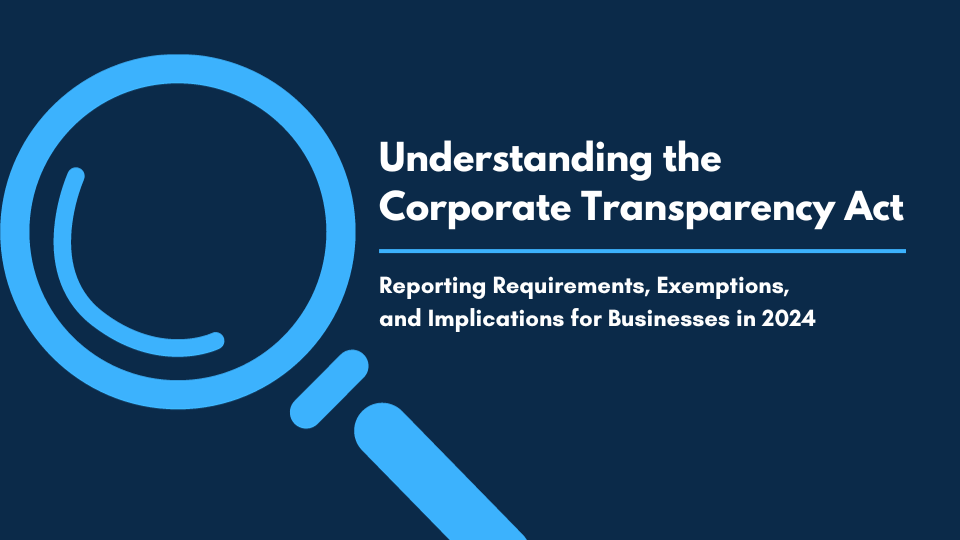
Beaird Harris Among America’s Top Registered Investment Advisors
Beaird Harris has been ranked as one of Financial Advisor Magazine’s 2024 America’s Top RIAs!


Effective January 1, 2024, a significant number of businesses are required to comply with the Corporate Transparency Act (“CTA”). The CTA was enacted into law as part of the National Defense Act for Fiscal Year 2021. The CTA requires the disclosure of the Beneficial Ownership Information (“BOI”) of certain entities from people who own or control a company.
It is anticipated that 32.6 million businesses will be required to comply with this reporting requirement. The intent of the BOI reporting requirement is to help US law enforcement combat money laundering, the financing of terrorism, and other illicit activities.
The CTA is not a part of the tax code. Instead, it is a part of the Bank Secrecy Act, a set of federal laws that require record-keeping and report filing on certain types of financial transactions. Under the CTA, BOI reports will not be filed with the IRS, but with the Financial Crimes Enforcement Network (“FinCEN”), another agency of the Department of Treasury.
Advising on BOI is a legal matter, and we strongly encourage you to consult with your legal counsel. However, as your trusted advisor we are providing some preliminary information for you to consider as you approach the implementation period for this new reporting requirement. This information is meant to be general-only and should not be applied to your specific facts and circumstances without consultation with competent legal counsel.
What entities are required to comply with the CTA’s BOI reporting requirement?
Entities organized both in the U.S. and outside the U.S. may be subject to the CTA’s reporting requirements. Domestic companies required to report include corporations, limited liability companies (LLCs) or any similar entity created by the filing of a document with a secretary of state or any similar office under the law of a state or Indian tribe.
Domestic entities that are not created by the filing of a document with a Secretary of State or similar office are not required to report under the CTA.
Foreign companies required to report under the CTA include corporations, LLCs or any similar entity that is formed under the law of a foreign country and registered to do business in any state or tribal jurisdiction by filing a document with a Secretary of State or any similar office.
Are there any exemptions from the filing requirements?
There are 23 categories of exemptions. Included in the exemptions list are publicly traded companies, banks and credit unions, securities brokers/dealers, public accounting firms, tax-exempt entities, and certain inactive entities, among others. Please note these are not blanket exemptions and many of these entities are already heavily regulated by the government and thus already disclose their BOI to a government authority.
In addition, certain “large operating entities” are exempt from filing. To qualify for this large operating entity exemption, the company must:
Employ more than 20 people in the U.S.;
Who is a beneficial owner?
Any individual who, directly or indirectly, either:
An individual has substantial control of a reporting company if they direct, determine or exercise substantial influence over important decisions of the reporting company. This includes any senior officers of the reporting company, regardless of formal title or if they have no ownership interest in the reporting company.
The detailed CTA regulations define the terms “substantial control” and “ownership interest” further.
When must companies file?
There are different filing timeframes depending on when an entity is registered/formed or if there is a change to the beneficial owner’s information.
What sort of information is required to be reported?
Companies must report the following information: full name of the reporting company, any trade name or doing business as (“DBA”) name, business address, state or Tribal jurisdiction of formation, and an IRS taxpayer identification number (“TIN”).
Additionally, information on the beneficial owners of the entity and for newly created entities, the company applicants of the entity is required. This information includes — name, birthdate, address, and unique identifying number and issuing jurisdiction from an acceptable identification document (e.g., a driver’s license or passport) and an image of such document.
What is the risk of non-compliance?
Penalties for willfully not complying with the BOI reporting requirement can result in criminal and civil penalties of $500 per day and up to $10,000 with up to two years of jail time.
As a reminder, advising on BOI is a legal matter, and we strongly encourage you to consult with your legal counsel. We recognize the complexity of this new filing requirement and are happy to help if we can. Please contact our office at 972-503-1040 to discuss your business situation.
No Professional Advice, Client Relationship, or Reliance on Information
Please note that any information or content on our Website, or any forms or tools on our Website which allow you to submit information or make calculations, and your use thereof, are not intended to provide any kind of professional advice, consultation or service, including but not limited to, legal, accounting, tax, or business advice. Nor does any such information, content, forms, or tools, or your use thereof or reliance thereon, create or constitute an attorney/client, accountant/client, or consultant/client relationship. You should therefore not use our Website or reliance on any information, content, forms, or tools on our Website as a substitute for any kind of professional advice. Rather, you should consult with a licensed professional, including one employed by our Company, for any accounting or tax questions you may have. You agree that we will not be liable to you or to any third party to the extent you treat or consider any information, content, forms, or tools on our Website as constituting any kind of professional advice. The information and content, including but not limited to forms and tools, presented on or made available through our Website are made available solely for general information purposes. We, therefore, do not warrant the accuracy, completeness or usefulness of any such information, content, forms, or tools, and any reliance you place on the same is strictly at your own risk. We disclaim all liability and responsibility arising from any reliance placed on such materials by you or any other visitor to our Website, or by anyone who may be informed of any of its content.
Our Website provides illustrative lists of services that we provide. Nothing contained on our Website shall be construed as an offer or guarantee to provide any particular services to you, nor shall anything on our Website be construed as a direct solicitation for employment by any persons, companies, or organizations. Prior results we have obtained for others do not guarantee a similar outcome.

Beaird Harris has been ranked as one of Financial Advisor Magazine’s 2024 America’s Top RIAs!

In times of high inflation, managing lifestyle creep is crucial to maintaining financial stability and achieving long-term financial goals.

Whether you’ve been investing for decades or are just getting started, at some point you’ll likely ask yourself some fundamental questions. The 10 listed here…
Schedule a complimentary call today. We’ll help you get started and learn more about Beaird Harris.